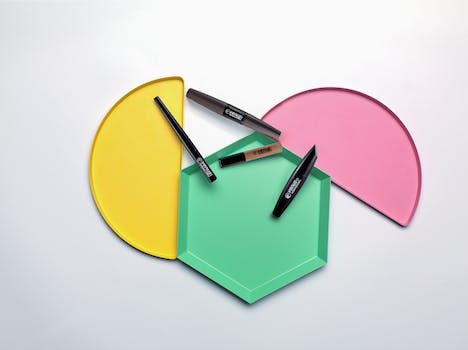How To Start A Business Makeup
“From passion to profit: A beginner’s guide to starting a successful makeup business.”
Introduction
Starting a business in the makeup industry can be a lucrative and rewarding venture for those with a passion for cosmetics and beauty. However, it can also be a challenging and competitive field to enter. To successfully launch a makeup business, it is important to have a solid plan in place and to understand the key steps involved in starting a business in this industry. In this article, we will outline some essential tips and strategies for starting a successful makeup business.
Finding Your Niche in the Makeup Industry
Starting a business in the makeup industry can be a daunting task, but with the right mindset and approach, it can be a fulfilling and profitable venture. One of the first steps in starting a business in the makeup industry is finding your niche. This means identifying the specific area of the makeup industry that you want to focus on and excel in.
There are many different niches in the makeup industry, including bridal makeup, special effects makeup, editorial makeup, and more. To find your niche, it’s important to consider your skills, interests, and experience. If you have a passion for creating bold and dramatic looks, then editorial makeup may be the niche for you. If you have experience working with brides and creating natural, glowing looks, then bridal makeup may be your niche.
Once you have identified your niche, it’s important to research the market and competition. Look at other businesses in your niche and see what they are offering. Consider what sets you apart from your competition and how you can offer something unique to your clients. This could be a specific technique or style, a focus on eco-friendly or cruelty-free products, or a personalized approach to each client.
Another important aspect of finding your niche is understanding your target audience. Who are the clients that you want to attract? Are they young and trendy, or more mature and sophisticated? Do they have a specific skin type or concern that you can address? Understanding your target audience will help you tailor your services and marketing efforts to attract the right clients.
Once you have a clear understanding of your niche and target audience, it’s time to start building your brand. This includes creating a business name, logo, and website that reflect your niche and target audience. Your branding should be consistent across all platforms, from your social media accounts to your business cards.
Networking is also an important part of building your business in the makeup industry. Attend industry events, connect with other professionals in your niche, and build relationships with potential clients. Word of mouth is a powerful marketing tool in the makeup industry, so make sure to provide excellent service and build strong relationships with your clients.
In addition to networking, social media can be a valuable tool for building your business. Create a strong presence on platforms like Instagram and Facebook, and use them to showcase your work, share tips and tutorials, and connect with potential clients. Consider partnering with influencers or bloggers in your niche to reach a wider audience.
Starting a business in the makeup industry can be challenging, but finding your niche is a crucial first step. By identifying your skills, interests, and target audience, you can create a unique brand and build a successful business. With hard work, dedication, and a passion for makeup, you can turn your dream of owning a makeup business into a reality.
Creating a Business Plan for Your Makeup Business

Starting a business in the makeup industry can be a daunting task, but with the right plan in place, it can be a rewarding and profitable venture. One of the first steps in starting a makeup business is creating a business plan. A business plan is a written document that outlines your business goals, strategies, and financial projections. It is essential to have a well-thought-out business plan to guide you through the process of starting and running your makeup business.
The first step in creating a business plan for your makeup business is to define your target market. Who are your ideal customers? What are their needs and preferences? Understanding your target market is crucial in developing a marketing strategy that will attract and retain customers.
Next, you need to define your products and services. What types of makeup products and services will you offer? Will you specialize in a particular type of makeup, such as bridal or special effects makeup? Defining your products and services will help you determine your pricing strategy and marketing approach.
Once you have defined your target market and products/services, you need to develop a marketing strategy. How will you reach your target market? Will you use social media, advertising, or word-of-mouth marketing? Your marketing strategy should be tailored to your target market and should be cost-effective.
Another important aspect of your business plan is your financial projections. How much money do you need to start your makeup business? What are your projected expenses and revenues? It is essential to have a realistic financial plan to ensure that your business is profitable and sustainable.
In addition to your financial projections, you should also include a management plan in your business plan. Who will be responsible for managing your makeup business? What are their roles and responsibilities? Having a clear management plan will help ensure that your business runs smoothly and efficiently.
Finally, you should include an executive summary in your business plan. An executive summary is a brief overview of your business plan and should include your business goals, strategies, and financial projections. It is the first thing that potential investors or lenders will read, so it should be well-written and compelling.
In conclusion, creating a business plan is an essential step in starting a makeup business. It will help you define your target market, products/services, marketing strategy, financial projections, management plan, and executive summary. With a well-thought-out business plan, you will be better equipped to start and run a successful makeup business.
Building Your Brand as a Makeup Artist
Starting a business as a makeup artist can be an exciting and rewarding venture. However, building your brand and establishing yourself in the industry can be a daunting task. Here are some tips on how to start a business as a makeup artist and build your brand.
Firstly, it is important to define your niche. What type of makeup do you specialize in? Do you focus on bridal makeup, editorial makeup, or special effects makeup? Defining your niche will help you target your ideal clients and establish yourself as an expert in that area.
Once you have defined your niche, it is time to create a portfolio. Your portfolio should showcase your best work and demonstrate your skills as a makeup artist. You can create a physical portfolio or an online portfolio using platforms such as Instagram or a personal website. Make sure to include a variety of looks that showcase your versatility as a makeup artist.
Networking is also crucial in building your brand as a makeup artist. Attend industry events, connect with other makeup artists, and reach out to potential clients. Building relationships with other professionals in the industry can lead to referrals and collaborations, which can help grow your business.
Social media is another powerful tool for building your brand as a makeup artist. Use platforms such as Instagram, Facebook, and Twitter to showcase your work, connect with potential clients, and build a following. Make sure to post regularly and engage with your followers to build a strong online presence.
In addition to social media, having a website can also help establish your brand as a makeup artist. Your website should include your portfolio, services, pricing, and contact information. Make sure your website is easy to navigate and visually appealing.
Pricing your services can be a tricky task as a makeup artist. Research the industry standard for your niche and adjust your prices accordingly. It is important to value your time and skills, but also remain competitive in the market.
Finally, providing excellent customer service is key in building your brand as a makeup artist. Make sure to communicate clearly with your clients, arrive on time, and be professional at all times. Going above and beyond for your clients can lead to repeat business and positive word-of-mouth referrals.
Starting a business as a makeup artist can be challenging, but with the right strategies, it can also be incredibly rewarding. Defining your niche, creating a portfolio, networking, utilizing social media, having a website, pricing your services, and providing excellent customer service are all important steps in building your brand as a makeup artist. Remember to stay true to your unique style and always strive for excellence in your work.
Marketing Your Makeup Business to Potential Clients
Starting a business in the makeup industry can be a daunting task, but with the right marketing strategies, you can attract potential clients and grow your business. In this article, we will discuss some effective ways to market your makeup business to potential clients.
Firstly, it is important to identify your target audience. Who are the people that you want to sell your makeup products or services to? Are they teenagers, young adults, or older women? Once you have identified your target audience, you can tailor your marketing strategies to suit their needs and preferences.
One effective way to market your makeup business is through social media. Social media platforms such as Instagram, Facebook, and Twitter are great tools for promoting your business and reaching out to potential clients. You can create a business page on these platforms and post pictures and videos of your makeup products or services. You can also engage with your followers by responding to their comments and messages, and by running contests and giveaways.
Another way to market your makeup business is by collaborating with influencers and bloggers. Influencers and bloggers have a large following on social media, and their followers trust their opinions and recommendations. You can reach out to influencers and bloggers in your niche and offer them your makeup products or services in exchange for a review or a shoutout on their social media platforms. This can help you reach a wider audience and attract potential clients.
Networking is also an important aspect of marketing your makeup business. Attend industry events, trade shows, and conferences to meet other professionals in the makeup industry and to showcase your products or services. You can also join local business groups and organizations to connect with other entrepreneurs and to learn from their experiences.
Word-of-mouth marketing is another effective way to promote your makeup business. Encourage your satisfied clients to spread the word about your business to their friends and family. You can also offer referral discounts or loyalty programs to incentivize your clients to refer new customers to your business.
Finally, it is important to have a professional and user-friendly website for your makeup business. Your website should showcase your products or services, provide information about your business, and make it easy for potential clients to contact you or make a purchase. You can also optimize your website for search engines to improve your visibility and attract more traffic to your website.
In conclusion, marketing your makeup business to potential clients requires a combination of different strategies. Social media, influencer collaborations, networking, word-of-mouth marketing, and a professional website are all effective ways to promote your business and attract new clients. By identifying your target audience and tailoring your marketing strategies to suit their needs and preferences, you can grow your makeup business and achieve success in the industry.
Managing Finances and Budgeting for Your Makeup Business
Starting a business can be an exciting and rewarding experience, but it can also be overwhelming, especially when it comes to managing finances and budgeting. As a makeup artist, it’s important to have a solid understanding of your finances and budgeting to ensure the success of your business. In this article, we’ll discuss some tips on how to manage your finances and budget for your makeup business.
Firstly, it’s important to create a budget for your business. This will help you keep track of your expenses and income, and ensure that you’re not overspending. Start by listing all of your expenses, including rent, utilities, supplies, and marketing costs. Then, estimate your income based on your pricing and the number of clients you expect to have. This will give you a clear idea of how much money you need to make each month to cover your expenses and make a profit.
Once you have a budget in place, it’s important to stick to it. This means keeping track of your expenses and income, and making adjustments as needed. For example, if you’re spending too much on supplies, you may need to find a cheaper supplier or adjust your pricing to cover the cost. It’s also important to set aside money for unexpected expenses, such as equipment repairs or emergencies.
Another important aspect of managing your finances is keeping track of your taxes. As a business owner, you’ll need to pay taxes on your income, so it’s important to keep accurate records of your expenses and income. Consider hiring an accountant or using accounting software to help you keep track of your finances and ensure that you’re paying the correct amount of taxes.
In addition to managing your finances, it’s important to consider your pricing strategy. When setting your prices, it’s important to consider your expenses, as well as the value you’re providing to your clients. You don’t want to underprice your services and not make a profit, but you also don’t want to overprice and turn away potential clients. Consider researching your competition and their pricing to ensure that your prices are competitive.
Marketing is also an important aspect of managing your finances. While it may seem like an expense, marketing is essential for attracting new clients and growing your business. Consider investing in social media advertising, creating a website, or attending networking events to promote your business. It’s important to track your marketing expenses and measure the return on investment to ensure that you’re getting the most out of your marketing efforts.
Finally, it’s important to have a plan for growth. As your business grows, your expenses will likely increase, so it’s important to plan for this. Consider setting aside a portion of your profits for future expenses, such as hiring additional staff or expanding your services. It’s also important to continue learning and improving your skills to stay competitive in the industry.
In conclusion, managing finances and budgeting is essential for the success of your makeup business. By creating a budget, sticking to it, keeping track of your taxes, setting competitive prices, investing in marketing, and planning for growth, you can ensure that your business is profitable and sustainable. Remember to stay organized, track your expenses and income, and make adjustments as needed to ensure the success of your business.
Conclusion
Conclusion: Starting a makeup business requires careful planning, research, and dedication. It is important to identify your target market, create a unique brand, and develop a solid business plan. Building a strong online presence and networking with industry professionals can also help to establish your business. With hard work and perseverance, anyone can turn their passion for makeup into a successful business venture.






